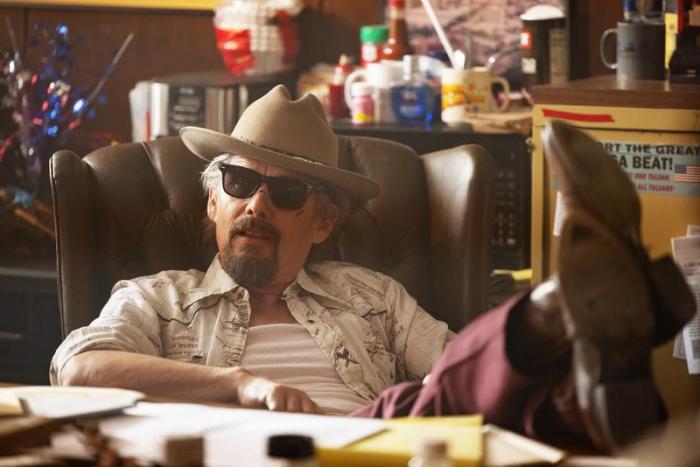By Tori Preston | TV | November 5, 2025

When Zohran Mamdani delivered his victory speech after winning the mayoral race in New York City last night, he made a point to thank “those so often forgotten by the politics of our city… Yemeni bodega owners and Mexican abuelas, Senegalese taxi drivers and Uzbek nurses, Trinidadian line cooks and Ethiopian aunties.” In that moment, he made it clear that while his campaign was about returning the power of the city to the hands of the working class, it was also about embracing who that working class truly is. This was a clear-eyed, full-throated victory for the immigrants who have always and will always be part of the fabric of America.
Of course, there’s another side to that coin: the Americans who have always been here. Which is why last night’s finale of The Lowdown hit so well, airing as it did against the backdrop of those election results. The conclusion of Sterlin Harjo’s noir tour of Tulsa’s underbelly also featured an election, for Governor of Oklahoma, and the results reflected that same hope for change we saw resonate across the country. Sure, Donald Washberg won, but he did it by finally rebuking the wealthy, white donors trying to use him to consolidate their influence and instead embracing the power of the Indigenous tribal sovereignties that make up Oklahoma. He returned Indian Head Hills to the Osage people, to honor Dale’s memory, and in doing so earned the support of far more voters than could ever have fit into whatever white supremacist compound One Well was planning for that land.
How did the show arrive there? Well, step one was getting Lee out of that messy showdown in the One Well church before those guns started firing. Marty handled that by bursting through the doors in the nick of time and claiming to be an undercover federal agent, there to arrest Lee on behalf of Donald. The pair make it out unscathed, save for a bullet that grazed Marty - though a quick stop at a farm supply shop for something that’s “like Advil” but is in fact “bovine vagina muscle relaxant” helps solve that little problem. Cue loopy Keith David mooing like a cow and giggling.
After the showdown, Frank turned himself in with a story about how he killed Arthur in self-defense, and he wasn’t charged. Lee ain’t having that, so he sets out to find Betty Jo, the only one who can corroborate why Frank was at Arthur’s apartment. Only she’s not exactly returning his calls these days, so he lights a fire under her - by delivering Dale’s secret notes to her daughter, Pearl. The very same notes that led Lee down this rabbit hole in the first place are now in the hands of the person Betty Jo has been trying to shield from the truth all along. When Betty Jo finds out, she agrees to meet with Lee to find out what exactly was in the notes. She doesn’t get the answer she was looking for, but Lee does. He secretly records her admitting she left the house unlocked at Frank’s request so those skinhead goons could scare Dale into agreeing to the land sale. Killing him may have been an accident, but then again, so was killing Arthur. It’s all the same in the end, though.
(Yup, I was wrong: Dale really was murdered. I’m not mad about it.)
With that last piece in place, Lee can finally write his big exposé about Dale’s murder. He then arranges for Marty to bring Donald to a secret meeting/barbecue at Cyrus’s office, where Lee can give him a chance to respond before it goes to print. Only it turns out that there’s still one piece of the puzzle missing from Lee’s version of events: Donald genuinely had no idea what Betty Jo and Frank were up to. He’s horrified to learn of the forces at play - forces he benefited from, even as they killed his brother - and admits that he was willfully in the dark, looking the other way about the dangers of One Well. His trust in Frank got Dale killed, the same way Lee’s trust in Betty Jo got Arthur killed, and maybe that’s why Lee offers Donald a proposition.
Gifting the land to the Osage was Lee’s idea, though we don’t see the conversation. Likewise, when Lee’s article runs and it’s about Dale’s life, rather than his death, you can see the shape of the plan Lee cooked up with Donald in that back office. The truthstorian of Tulsa finally figured out that the truth isn’t just a cudgel to tear down those in power; it can be a tool to build something new instead. He gave Donald the truth and showed him how to use it to do the right thing, then he published a version of the truth that was inspiring rather than condescending. He didn’t just help Donald get elected, but guaranteed he’d be a better Governor for the people of Oklahoma than he ever would have been if he’d gotten there through the machinations of wealthy donors and white supremacists.
It’s a tidy ending, tied up far neater than I expected, but it was satisfying precisely because it cut its optimism with the same messy, complicated humanity the show has always run on. I keep coming back to the cold open, a flashback to the only time Lee met Dale in person, when the man swung by the bookstore. Dale complimented Lee’s work, and Lee tried to explain why he calls himself a truthstorian: “You know how they say there’s more to every story? Well, that’s what I try to find.” He found it all right, but when Donald asked Lee if he’d ever met Dale, he lied and said no. That was one truth he chose to keep to himself.